
A 7-Step Guide to Becoming a WordPress Expert
If you’ve been using WordPress for a while, it’s likely that you feel pretty confident in the day-to-day operation of your site.
In this post, we’ll discuss how to become a “WordPress Expert” and then we will walk you through some steps to help you achieve that status.
It’s important to note that when we talk about WordPress “experts,” we’re using the term somewhat loosely. WordPress is a massive platform. There’s no real way to become an expert on every aspect of the entire Content Management System (CMS).
However, there are ways to acquire extensive WordPress knowledge. For the purposes of this article, we’ll define an expert as someone who is well-versed in WordPress usage, can build a high-quality WordPress site, stays on top of platform-related updates and news, and actively participates in the community.
Alright, let’s get to it!
Guide to Becoming a WordPress Expert
Here are some steps that can help you get plugged into the WordPress community. We’ll recommend some learning resources at the end as well.
Step 1: Assess Your Current Knowledge and Note Any Gaps
Even if you have a pretty good grip on how to use WordPress, you probably know you have some gaps in your skillset.
A quick way to assess your current knowledge, compared to where you want to be, is to consider what WordPress work you currently pay someone else to handle for you. Do you outsource work like design, development, SEO, maintenance, or speed optimization?
Learning how to take care of those tasks yourself will help you become a more independent user.
Alternatively – because it’s hard to know what you don’t know – you can check out an online WordPress course and see if there are any lessons on unfamiliar topics. Here’s a screenshot of a typical online basic WordPress course.
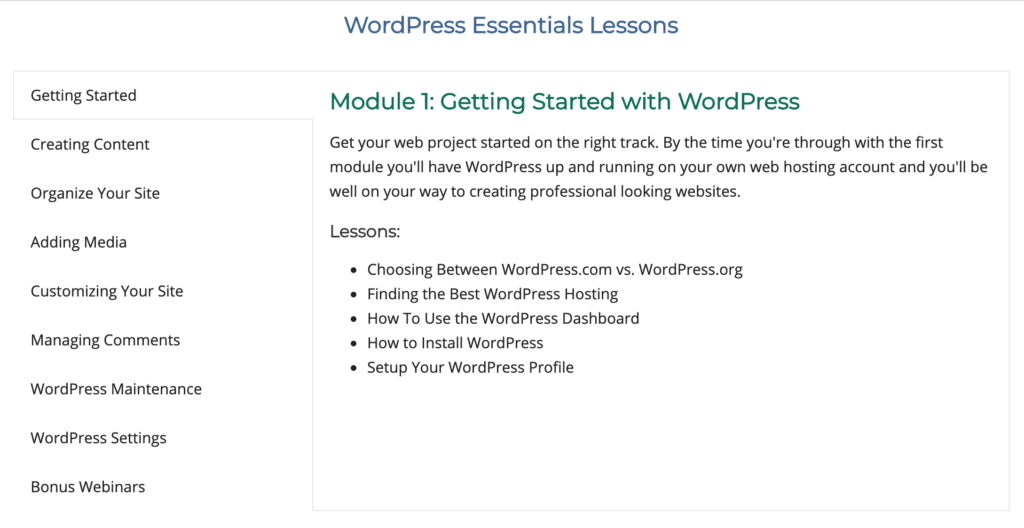
Once you’ve determined what you still need to know, you’ll have a better idea of what learning opportunities to look for.
Step 2: Ensure You Understand How WordPress’ Key Components Work Together
There are a lot of moving parts that make up WordPress, but the three key components are the WordPress core, your theme, and various plugins. While you may have a basic understanding of each component, there’s probably more you can learn.
WordPress Core
For starters, what’s called the “WordPress core” refers to the WordPress core files. You should be familiar with the main core files and what each does. You should also know which you can edit safely and which ones you should never touch.
Another part of WordPress mastery to understand the built-in and custom post types and their associated template files.
When you master the concept of custom post types, you can create your own, and the content in your websites will really start to stand out. You can create a custom post type for nearly any collection of content you want to display on your site.
For example, you could have a special page listing cars for sale, which links to each individual car, which is authored as a custom post in the back end. You could have a part of your site for recipes, or events, or movie reviews, all with their own unique features.
There are custom post type plugins that help you create custom post types, and when your skills improve enough, you can learn to code them on your own.
The Beaver Builder plugin works with custom post types, so not only can you have custom posts describing cars, you can also have beautiful layouts of the information. Or, you can build Beaver Themer layouts for the pages that describe the cars and car categories.
WordPress Themes
Themes control layouts and style in parts of the page outside the content area, such as headers and footers. Many themes also offer a limited choice of page templates and have some settings for default styles. Because the use of a theme is mandatory in WordPress, it’s good to stay current with which are the most popular free and premium WordPress themes and what makes each unique. You should also make sure the theme for your own site stays current with WordPress core updates.
It’s also useful to understand the concept of the WordPress theme framework and the difference between parent and child themes.
Once you start to understand the more technical aspects of themes, you’ll be able to make a better decision about whether you prefer a bare bones theme that you can further customize or one that builds in a multitude of options. As your skills improve further, you’ll be able to review themes for their coding quality and performance.
Even if you’re interested in using the Beaver Themer add-on plugin to design areas of the page normally controlled by the theme, if you understand what a theme does then you’ll have a better understanding of how and where to override it with a Themer layout.
WordPress Plugins
Whereas themes control layouts and styles, WordPress plugins control functionality, and there’s a plugin for almost every type of functionality: from page builders to specific content design elements (sliders, galleries, forms) to security, performance, backup, and analytics tools. It’s important to be familiar with staples such as Yoast SEO, Jetpack, and WooCommerce.
There are many free plugins to choose from, and even more premium plugins with advanced functionality. With many of the plugins, particularly those that help with content organization and design, you’ll see that they incorporate custom post types.
For example, the WooCommerce plugin installs a Products menu item into the WordPress admin panel, and from there you can click the Product button to create a custom post for each individual product.
As you start to learn code, if you create multiple sites and find yourself adding the same custom code to the functions.php file for most of your sites to create the same custom functionality, it’s not hard to turn that into your own custom plugin.
Step 3: Gain a Strong Command of the Customizer and Other WordPress Settings
Anyone can pick up WordPress and use templates, themes, demos, and other prebuilt elements to create a website. However, WordPress experts are capable of taking websites to the next level through advanced customization.
There are many ways to go about creating a custom WordPress site, including the use of plugins or custom code. It’s important to start with a thorough knowledge of WordPress’ native customization capabilities, though.
So, before you can call yourself a WordPress expert, you’ll need to have a handle on how to use the Customizer and WordPress’ primary settings.
Although the Customizer settings for each theme are different, you should be able to quickly adjust the settings of the theme you’re working with to create a unique-looking site that meets end users’ needs.
Here’s an example of the Customizer settings of the Twenty Seventeen theme.
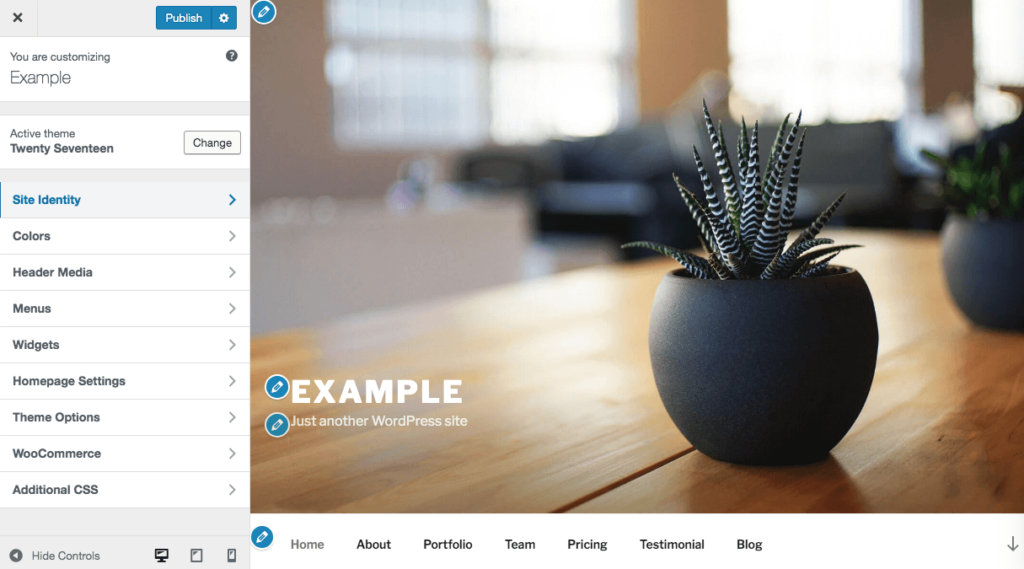
You should also be able to use standard WordPress settings to add certain structures and features to a site. Just to name a few basics, you should know how to:
- Create a static home page.
- Manage memberships and comments.
- Hide a site from search engines.
- Set a default permalink structure.
To some extent, the best way to learn these things is by using them. A little practice can go a long way. However, the WordPress Codex also has useful articles regarding Customizer and WordPress settings.
Step 4: Learn About the Technical Underpinnings of WordPress
A key part of knowing WordPress and its themes and plugins deeply is understanding how they’re created, which means learning a little about code. Now we’re not saying you need to have advanced fluency in multiple coding languages in order to be a WordPress expert.
On the contrary, it’s possible to be an expert on WordPress without being able to do much more than a little tinkering.
By design, WordPress doesn’t require coding knowledge, but understanding the basics of the languages that make up the foundation of the WordPress platform will help you with troubleshooting, fielding questions from other users, and advanced customization.
This means knowing the basics of how WordPress uses HTML, CSS, PHP, and JavaScript. See our learning resources section at the end of this post for suggestions.
Step 5: Learn about the Data base and Database Maintenance
One of the powerful features of WordPress is that it is a content management system (CMS) integrated with a database, which means that pages are dynamically converted to HTML and served with content pulled from the database.
It is helpful to learn how information related to posts and custom posts is stored in the database, so you can troubleshoot if you run into problems. Themes and plugins store their information in the database with their own unique prefixes, and it’s helpful to recognize those, too, for purposes of troubleshooting.
One of the many benefits of this architecture is that you can create custom fields in the database, which you can integrate with standard posts and custom post types.
Going back to the example of a custom post type for cars, when authors are filling out the post with car description, you could include custom fields for all the information that you want to appear with every car, such as year, make model, condition, and so on, which you can then display in a uniform way on the page.
Beaver Themer can connect to WordPress custom fields, Advanced Custom Fields, and Pods custom fields so you can easily incorporate custom fields into your Beaver Builder layouts.
Here’s a screenshot showing one event from a custom post type called Events. The single event pages use a Beaver Themer Singular layout. The date, time, and the entire Special Notes sidebar contain various custom fields so that all of the event pages have similar information in a standardized location.
In this example, the CPT and the custom fields were all created by the Pods plugin, and the custom field connections were made available through the Pods integration with Beaver Builder.
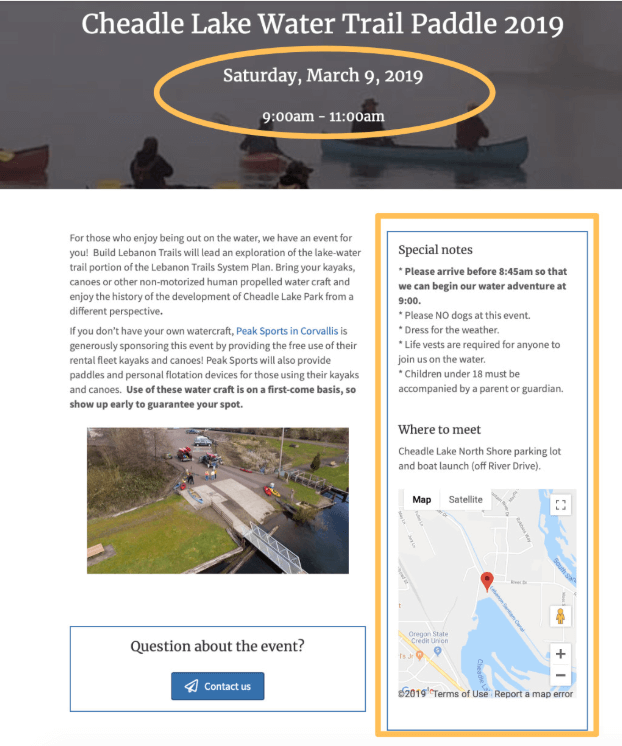
Normally you won’t interact directly with the database unless you’re troubleshooting, but there are a few basic maintenance tasks WordPress experts should be able to handle. For example, you should know the role of phpMyAdmin and the database in manually installing WordPress:
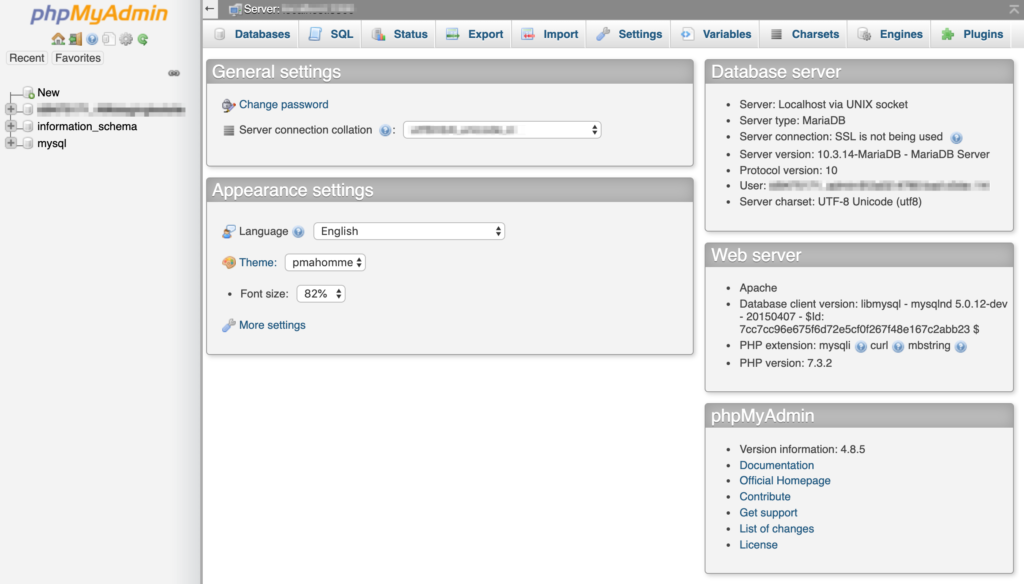
You should also know how to do basic database maintenance to optimize site performance, or at least you should know how the database affects performance so you can use a plugin to manage this task.
Step 6: Become Familiar With WordPress’ Hosting Options
Hosting is a vital component of what goes on behind the scenes to keep a site running. You should know about the following aspects of hosting:
- How
web hosting works and what to look for in a hosting provider - What different types of hosting are available
- Which companies are the most popular
- What managed WordPress hosting entails
Knowing these basics helps you select the right hosting plan for your site and troubleshoot server-related errors that affect your site. It will also help you talk to the technical support people at your hosting company more intelligently.
Step 7: Interact with the WordPress Community and Give Back
One of the many things that sets WordPress apart from other platforms is the fact that it’s open-source, meaning the platform code is visible to anyone. As a result, many WordPress experts and enthusiasts have the chance to directly contribute to building the platform.
The next step in becoming an expert is to join the effort to improve and expand the platform. If you happen to have extensive coding knowledge and experience, this could mean contributing to WordPress core development.
However, as we said earlier, you don’t have to be a developer to be a WordPress expert. Once you’ve mastered the basics, you can contribute by offering your thoughts and ideas in various ways.
Make WordPress Core is probably the best place to get started. There you add comments to posts, report bugs, or even work on addressing support tickets:
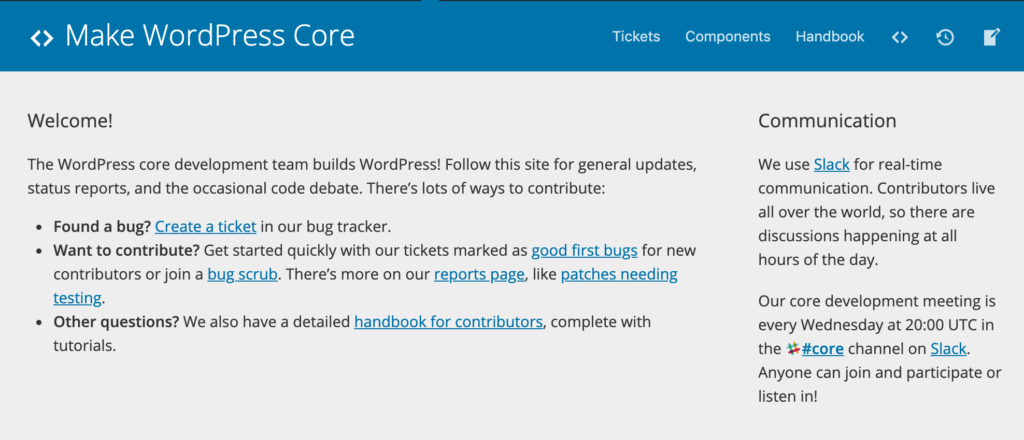
If this doesn’t sound like your strong suit, there are plenty of other options. You can also:
- Join the Theme Review Team.
- Become part of the Plugin Review Team.
- Write WordPress documentation.
- Translate WordPress into languages other than English.
- Help design the WordPress User Interface.
- Keep WordPress accessible.
- Create WordPress Training lesson plans.
As you can see, there are plenty of ways to get involved. Being part of the ongoing improvement of the platform is not only a smart way to stay in the loop about upcoming changes, but also gives back to the WordPress community and keeps the platform alive.
Another responsibility that comes with being a WordPress expert is sharing your knowledge with less experienced users. The Support Forums are full of people looking for help with specific issues, and they rely on generous experts to post replies to help them out:
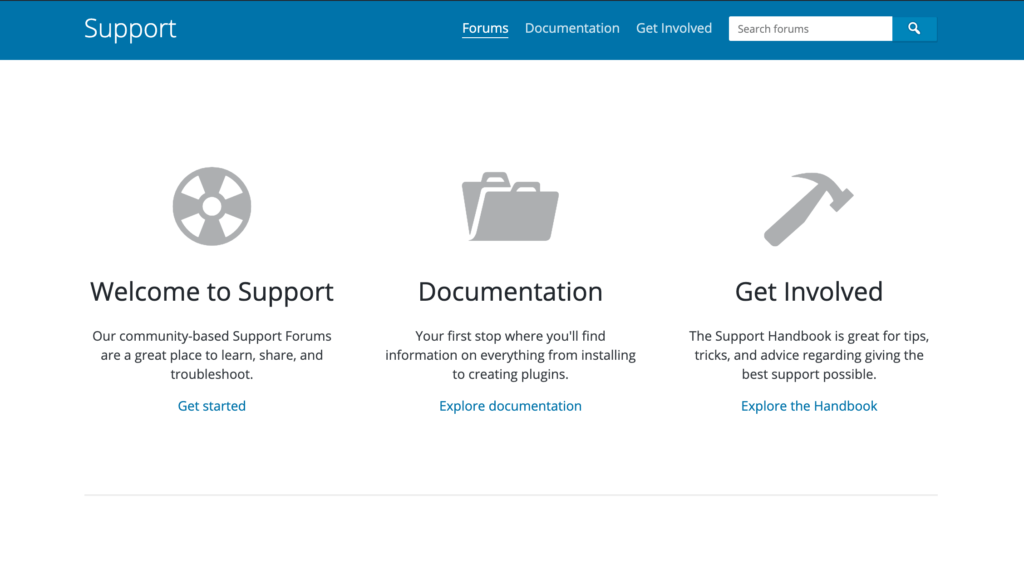
Additionally, creating blog posts, video tutorials, or even a podcast on WordPress-related topics can help support newer users. Think of how much information you could learn from WordPress-related blogs and tutorials contributed by volunteers.
That said, you don’t necessarily have to create your own blog or an entire YouTube channel to share your knowledge. You can always become a contributor at a larger WordPress blog or even write guest posts.
If writing and video editing aren’t really your thing, maybe you’d rather submit an application to speak at a WordCamp or a WordPress meetup. There are plenty of opportunities to use your strengths and share your expertise if you know where to look.
Conclusion
A basic understanding of how WordPress works is all you really need to keep things running smoothly on your site. However, if you want to implement more advanced features and reduce your need for outside help, you’ll need to advance your knowledge and become a WordPress expert. The time you spend learning will quickly be paid back in time and frustration saved when you need to solve a problem or implement some advanced features on your site.
In this post, we explored seven steps you can take to start becoming a WordPress expert:
- Assess your current knowledge and note any gaps.
- Ensure you understand how WordPress’ key components work together.
- Gain a strong command of the Customizer and other WordPress settings.
- Learn about the technical underpinnings of WordPress.
- Learn about the database and database maintenance.
- Become familiar with WordPress hosting options.
- Interact with the WordPress community and give back
Learning Resources
For basic coding skills, a free site such as Codecademy is a valuable resource if you don’t have previous coding experience:
Its entry-level development courses should teach you enough to accomplish basic tasks. You can also learn from reading blog posts, although this brings with it a degree of trial and error.
The WordPress Codex is also an excellent resource where you can start reading up on the basics and eventually attain full WordPress honors if you want to go that far.
You can teach yourself by reading blog posts and watching video tutorials or try one of the online WordPress courses. If you’re willing to invest a little money in your future success, see our guides to WordPress online training courses and WordPress books.
Do you have any questions about becoming a WordPress expert? Ask them in the comments section below!
9 Comments
Related articles
LifterLMS and Beaver Builder Integration: Effortless Online Course Websites
Introducing the LifterLMS and Beaver Builder integration. Streamline your online course website creation by combining powerful learning management tools with…
Figma to Beaver Builder: Design and Build WordPress Sites
Curious about converting Figma designs into WordPress websites? A smooth design-to-development workflow is essential for saving time and delivering top-notch…
Best Practices for Managing Web Design Clients
Managing web design clients effectively is one of the most crucial skills for a web designer, agency, or freelancer. Whether…
Join the community
We're here for you
There's a thriving community of builders and we'd love for you to join us. Come by and show off a project, network, or ask a question.
Since 2014
Build Your Website in Minutes, Not Months
Join Over 1 Million+ Websites Powered By Beaver Builder.
 Beaver Builder
Beaver Builder 
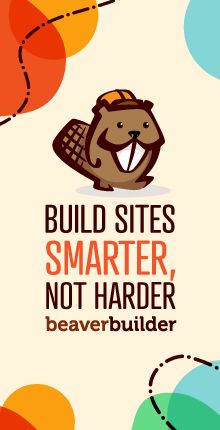
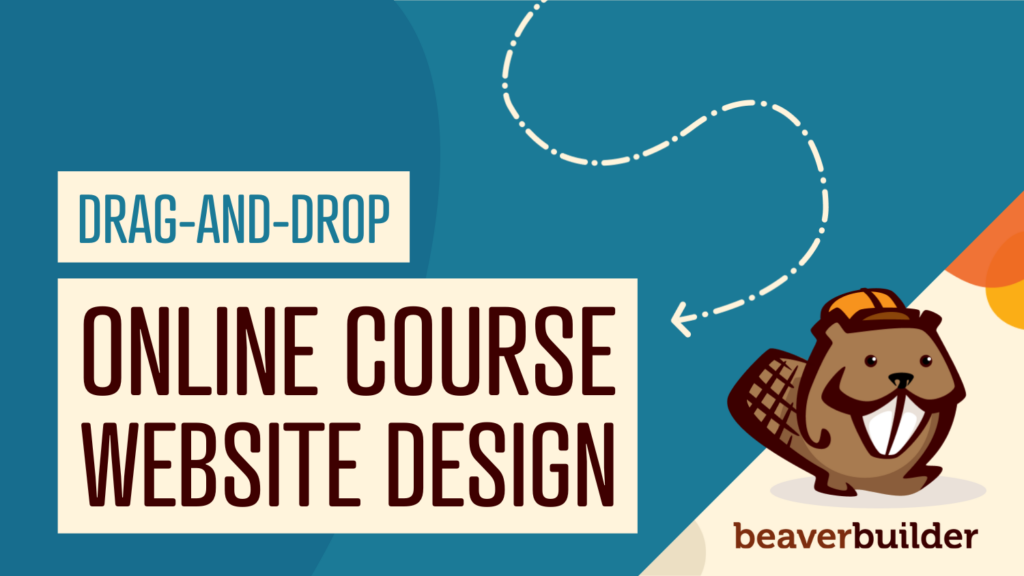
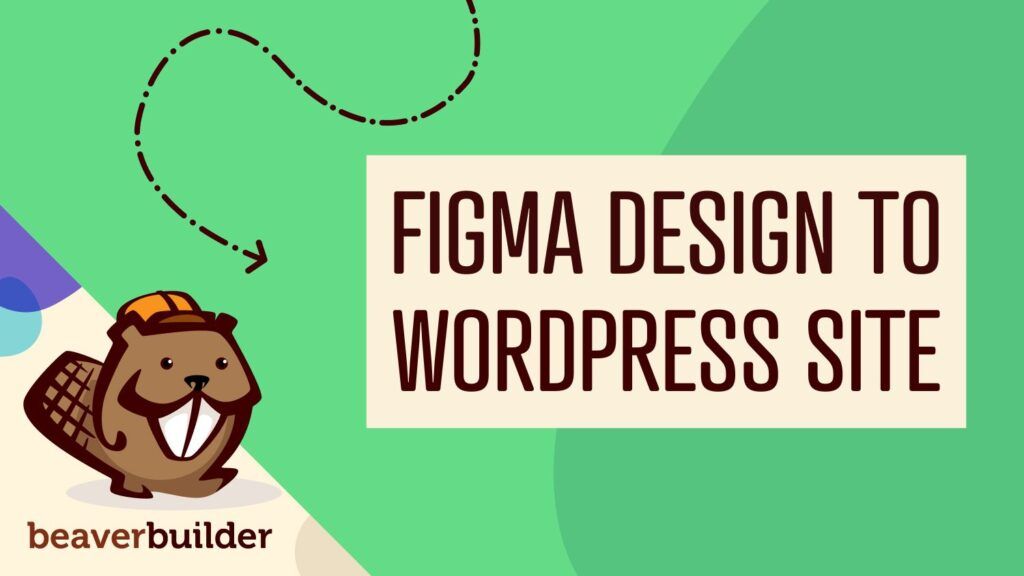
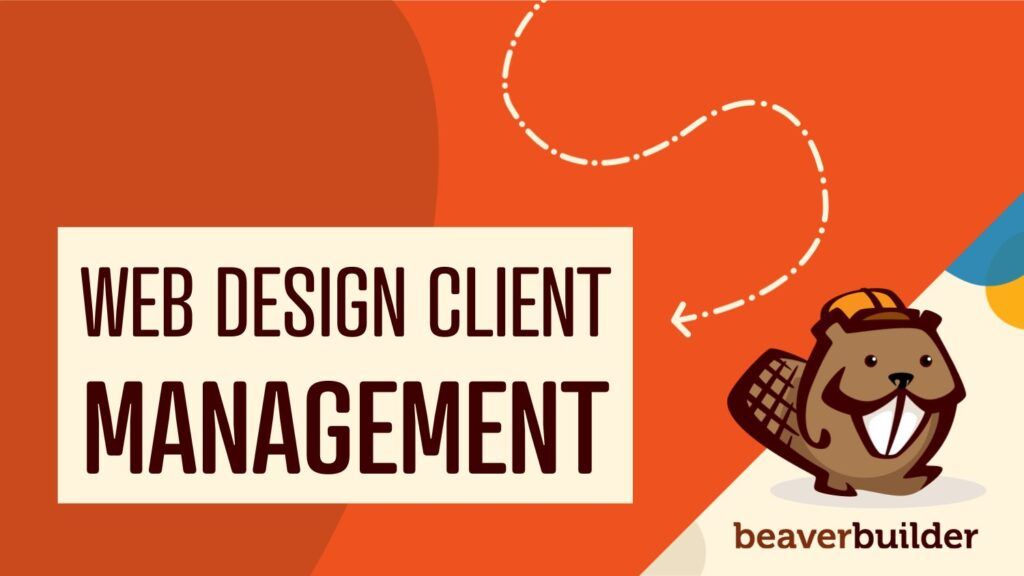
Hi Anthony Tran,
Thanks for sharing the article. clear explanation.
This is a great start. There are so many possibilities with WordPress that being an Expert at all aspects is impossible. But it is important to learn everything you can about the aspects you need to know about. I would make sure to include Best Practices for SEO even though that is web design term it applies to WordPress.
Hi, these tips are really helpful. Now, these will be on my sticky notes until I become a WP expert.
Thanks for sharing
Hey Anthony Tran, it looks like I came across this article after long time since you published it. You’ve included some nice and useful resources to learn WP. I complete agree with you Still I enjoy reading the article. it is very informative & useful article for WordPress Developer. Thank you for sharing.
Thanks Ajay! Appreciate the feedback =)
Great post Anthony. I love how you have simplified the article and presented your points in a fresh manner. I do agree with the points mentioned but the highlight will always be to build a community and give back to get more. Keep writing!!
A great guide for beginner WP experts. Everything you need to get started.
Thanks for sharing this most valuable information to become a Wordpress Expert!
Good post, Anthony. Obviously, there is much more to becoming a WordPress expert, but this post gives a good “bird’s eye” overview of what’s required.